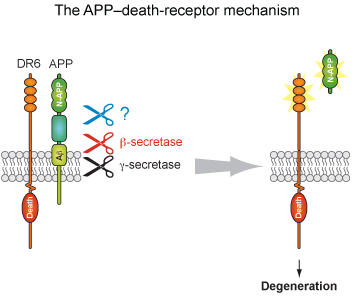What is apoptosis? Apoptosis is the self-destruction of the cell. (6a)Why do the cells commit "suicide"? In apoptosis, the cell usually commits suicide so other cells around it can live. This controls the cell number of each organism so it can live. Also, this pre-planned death is done neatly so it would not damage the other cells. (6a) Also, apoptosis is necessary for human evolution. A mutation that prevents apoptosis from occurring will, for example, cause the webbing of hand and feet. That is, apoptosis allow cells that connect the hand and feet to die and separate the ligaments. (6a) | This picture illustrates what happens when apoptosis does NOT function due to a mutation. |
As you already know, Alzheimer's disease is a form of dementia that causes cells to progressively die. Within studies, apoptosis may play a role in dementia, because the cells may be getting the "wrong signals" and commit suicide when it was not supposed to. Therefore, the misinterpretation would cause cells to die too early when other cells were not ready to mature.
Genentech, a biotech company in south San Francisco, has made a discovery that helped us further understand the cause of Alzheimer's Disease. Within the February 19th edition of Nature, Genentech scientists Marc Tessier-Lavigne and Anatoly Nikolaev provided another perspective on Alzheimer's Disease. (6b) Click Here to read an abstract published in Nature. |
Death Receptor 6
What is it? Nerve cells carry two proteins, APP and DR6 (Death Receptor 6). Genentech scientists have discovered that when they are deprived of trophic (survival) factors, they activate the APP protein by cleaving it to release the N-APP fragment. The N-APP fragment then binds and activates DR6 that triggers degeneration of the nerve cell and nerve fiber. (6c) What does it do? Just like apoptosis, this self-destructive mechanism is used to remove excess nerve cells and nerve fibers, but usually during embryonic and fetal development. (6c) Why is it important? The discovery led Genentech scientists to propose that this mechanism is hijacked by Alzheimer's disease and contributes to the degeneration of nerve cells and nerve fibers that occurs in the disease. (6c) |


